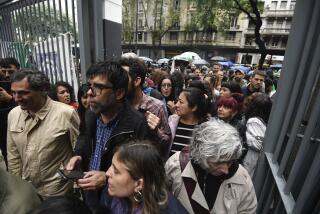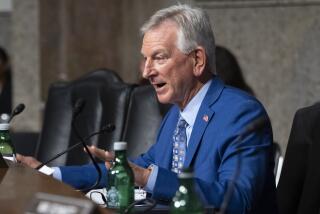Argentine Unrest Flares Again but Rebellion Fizzles at 2 Army Posts
- Share via
BUENOS AIRES — Anger and division within the officer corps of Argentina’s troubled army flared anew Tuesday, with a apparently stillborn revolt by two small provincial garrisons.
Two days after President Raul Alfonsin personally ended a larger mutiny, unrelieved military disgust over his human rights policy and insistence on civilian control over the armed forces sparked the new, short-lived resistance.
A midday rebellion against the army’s new high command by middle-ranking officers of an infantry regiment in the northern city of Tucuman was put down by the colonel of a nearby unit.
Surrenders Peacefully
Also Tuesday, the major commanding a small detachment of army engineers in the northwestern Andean capital city of Salta also announced that he was defying commands. Hearing no echo of support, he later surrendered peacefully to a colonel commanding the Salta garrison. “It’s over,” the colonel told local reporters that evening.
In a communique Tuesday night, the army described the situation as “absolutely normal” at major garrisons around the country. By late in the day, at least 10 generals and more than a half dozen colonels had been retired or relieved since the military crisis began on Holy Thursday.
Alfonsin helped calm a bad case of national jitters when he left his downtown office to return to his suburban residence for dinner Tuesday night. “Everything’s OK,” he told reporters as he left.
Although Tuesday’s alarms appeared no more than the aftermath of the Holy Week revolt that Alfonsin crushed on Easter Sunday, federal police were on special alert Tuesday night, and political parties and labor unions stood poised to order their supporters into the streets in new rallies backing Alfonsin.
To ease tensions that included reports of serious unrest within the navy, a federal court postponed the convening, originally scheduled for today, of the trial of ranking naval officers accused of human rights violations.
The Supreme Court met Tuesday night to consider an imminent ruling that could influence the outcome of human rights accusations against about 200 military and police officers. The court must decide whether subordinates may take legal refuge in the fact that they were following their superiors’ orders.
Officers who were lieutenants and captains--the cutting edge of military repression of Marxist guerrillas during the so-called “dirty war” of 1976-80 in which security forces murdered at least 9,000 people--are now disaffected majors and lieutenant colonels, uncertain how their past activities will affect their future.
These middle-ranking officers resent being held legally accountable for actions they carried out at the command of others, and they believe that the generals have not defended them adequately before the Alfonsin government on the human rights issue.
The nearly 200 rebel officers, led by a lieutenant colonel, who were disarmed by Alfonsin’s personal Easter intervention had demanded appointment of a new army commander more to their liking.
Instead, Alfonsin appointed an older general, Jose S. Caridi, further infuriating the officers following widespread rumors that the president had agreed to their demands. The officers who mutinied Tuesday stressed that they were rebelling not against Alfonsin but against Caridi’s authority.
While Buenos Aires newspapers published compelling accounts Tuesday showing that the Holy Week military revolt was wider than the government conceded at the time, Alfonsin himself vigorously denied that he had reached any agreement with the rebels.
In a meeting with the military high command Tuesday at the presidential palace that was subsequently shown on national television, Alfonsin said, “It would have been crazy not only to accept but even to discuss the name of a future army commander” with the rebels.
“I want to clarify in no uncertain terms that there was no negotiation, and consequently there was no document to sign, or any agreements that were established,” the president said.
Alfonsin, who casts a long shadow as one of Latin America’s leading democrats, returned constitutional government to Argentina in late 1983 after nearly seven years of military dictatorship. He ordered the human rights trials, and he has consistently sought to assert civilian authority over a military institution more accustomed to command. However, he has also infuriated human rights advocates by fixing a time limit on the filing of new accusations.
More to Read
Sign up for Essential California
The most important California stories and recommendations in your inbox every morning.
You may occasionally receive promotional content from the Los Angeles Times.













